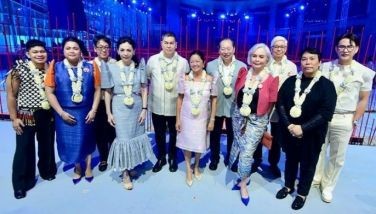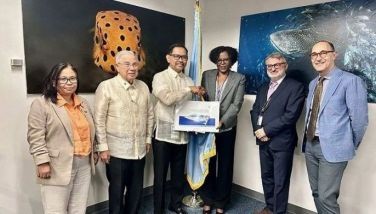Diwata-1 builder hits DOST for lack of compensation
MANILA, Philippines – Trouble seems to be brewing at the Department of Science & Technology (DOST)’s microsatellite project – not with Diwata-1 that has been successfully transported to the International Space Station, but with the group of Filipino engineers now in Japan building Diwata-2.
One of the nine engineers and scientists in Japan’s Tohoku University and Hokkaido University, Juan Paolo Espiritu, came out on social media last Friday to make public the predicament of members of the group over their lack of compensation and acknowledgment for their efforts in building microsatellites for the country.
In his Facebook post, Espiritu, 23, a graduate of electronics and communications engineering from the University of the Philippines’ Diliman campus, bared that they have worked on Diwata-1 and are now working on Diwata-2 without employment contracts that officially designated them as engineers and laying down their compensation for working on microsatellites.
He claimed the DOST was only recognizing them as “students” on government scholarships to earn graduate degrees – MS in Aerospace Engineering in Tohoku University and MS in Mechanical and Space Engineering and Cosmosciences from Hokkaido University – while at the same time joining the microsatellite building program and working on the actual design, fabrication and assembly of the Diwata microsatellites.
Of nine Filipino engineers sent by the DOST to Japan as scholars-microsatellite builders, seven are mainly scholars and are not employed by the DOST as engineers. They are Espiritu, Ariston Gonzalez, Julian Marvick Oliveros, John Leur Labrador; Kaye Kristine Vergel and Benjamin Jonah Magallon.
Two others, Gerwin Guba and Harold Bryan Paler, deployed sometime last year, were engineers of the DOST’s Advanced Science and Technology Institute assigned as senior science research specialists.
Espiritu, Gonzalez, Oliveros, Labrador, Guba and Paler are in Tohoku University; Magallon, Mitchao and Vergel are at Hokkaido University.
“They call us ‘students,’ yet normal students go in at 9 a.m. and leave at 5 p.m. Normal students attend class all the time. Normal students are almost finished on their individual thesis projects. Normal students have personal time on the weekends. Normal students enjoy holidays. But no. We are not just students. We go in at 9 a.m. and leave at 1 a.m. Most of the days, we have no choice but to skip our classes to work on the microsatellite. We have no chance to work on our thesis projects. We go to the lab on Saturdays. We go to the lab on Sundays. We go to the lab on holidays. We go to the lab during Christmas. So no. We are not just students,” Espiritu said.
Espiritu said that a contract they signed with DOST had only stated that they were government scholars who are to pursue space technology-related masteral courses at the two prestigious Japanese universities, but did not officially recognize them as engineers working on the microsatellites.
“All the contract entailed was for us to receive a scholarship to study Aerospace Engineering in exchange for years of return service. Of course to build the satellite, we would have to study the technology behind it, and so we expected that the scholarship was a given part of the project. But according to the contract, that was it. Nothing more followed. According to the contract, we are to build the satellite without pay, with four years of return service. On paper, we were just students. On paper, we weren’t part of the project. On paper, we were not engineers,” Espiritu said.
Espiritu said that before signing this unsatisfactory contract, they had tried to get a revised one with the DOST, citing the silence on their recognition as engineers and also on their compensation as engineers.
“But instead, we were given a promise – a promise that a more suitable contract will be made, stating our clear involvement and responsibilities for the project and, most importantly, our rights as engineers. In their words, ‘take it in good faith, that you will be taken care of.’ As we had high respect and trust for DOST and the leaders of the project, we agreed to sign the papers, thinking that this mission of building the satellite is above any of us,” Espiritu said.
Espiritu said that their shabby treatment was more humiliating when they see DOST officials and officers making regular expensive visits to Japan, apparently with no worries over expenses and salary, and service bonds.
“It just really baffles me, how DOST can afford all these visits, the airfare, the accommodation and the fancy food, but when it comes to the engineers, merely staying in Japan to work on the microsatellite is taken against them, with the 7-year service bond (three more added to the original four). This PHL-MICROSAT project is a billion-peso project, and despite being an engineering project, the engineers aren’t included in the project,” Espiritu said.
Diwata-1 was successfully transported to the International Space Station last March 23 with the successful launch of an Orbital ATK Cygnus spacecraft and its reaching the ISS.
This April, Diwata-1 is set to be deployed into orbit from ISS.
Carlos Primo David, executive director of the DOST’s Philippine Council for Industry, Energy and Emerging Technology, said they will issue an official statement regarding Espiritu’s complaint today.
- Latest
- Trending

































